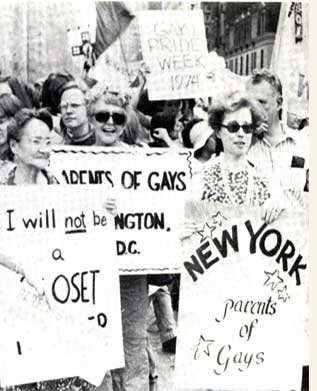




Interview with Elaine Benov, involved in PFLAG
since 1973
When did you join PFLAG? How long have you been involved in PFLAG?
I joined in either 1973 or 1974. I am not involved now--but I am still a member and pay my dues, but I have not participated since the early 1990's.
What prompted you to first join PFLAG?
I found out that I had a gay son, and then my husband was in the car listening to the radio and he heard someone interviewed from Parents of Gays--that's what PFLAG was called back then--and he immediately got out of the car and called me, because of course there were no cell phones back then. He told me that we had to go to a meeting, and that's when we started to go.
What kinds of things did you do as an active PFLAG member?
PFLAG was really very new at the time, and it was the first of its kind of organization in the country. We talked about things that were bothering us--we were not informed, and didn't understand what our sons were going through. We talked about our struggles and our concerns. It was mostly mothers with sons, and not with their husbands. My husband always went with me, which made it easier because I knew that he was sharing the same experience. Everyone was nervous. We always got a lot of literature, and books from the library, but there weren't very many books on the topic at the time. I was in therapy then, and I knew my son was struggling, but I didn't know what was wrong, and he wouldn't tell me. My son went to the therapist as well, and she knew about his being gay, but she didn't tell me about it. That's part of the therapy process--arriving at conclusions by yourself. Well, eventually I asked her if she thought he might be gay. She didn't confirm or deny it. When I asked him about it, he told me, and at first I didn't understand. It didn't take long before she realized that my son didn't have a problem, I had a problem. He was the same son we always knew, and my husband and I realized that.
What were the meetings like?
We met in a church in Manhattan--there were 10 or 12 of us, mostly mothers. I went with my husband. It was uncomfortable, we sat in a circle and introduced ourselves. There was crying, and people were very distraught. It was a nervous time.
What do you think was your greatest accomplishment at PFLAG?
PFLAG started gradually--one of the parents spoke, and we went and listened. We had to learn to feel comfortable and I thought I could do that. It was hard to get parents to come and talk about their gay children, but we wanted people to understand. We started to speak in a speaker's group, but it was difficult. It was different to say "I love my son" and "I love my gay son" in public. They're just on different plateaus. You have to come to a certain point with yourself. I knew that I loved my son, and it didn't make a difference if he was gay or not. We spoke at colleges and high schools. We were instrumental in starting a branch of PFLAG in Westchester; we went for several months to lead discussions and help it get started. We went to New York state colleges, like Oneonta. It made me feel good to help. Also, we had an extra telephone line in our house that was a PFLAG hot line. Parents would call and I would encourage them, or gay children would call to ask how they should come out to their parents. It was very rewarding. We went to meetings for ten years straight, without missing one. My husband, Bob, was involved just as much as me, and it made our gay sons very happy that we did this. We learned a lot--I became a different person.
What does it mean to you to be a part of PFLAG?
I'm proud to be a part of PFLAG. It is a respected organization now, and I am certainly very proud. It meant a lot to me to have an organization like that exist, and it was very helpful. I was involved almost from the start, there were only a few of us. Then came other states, conferences, conventions. The first convention was in 1982 in California, the second was in New York City, and the third was in Colorado. Someone always volunteered to host the convention. After the third convention no one volunteered, so my husband said that he and our son, Johnny, would have it in Atlanta. So the fourth convention was held in Atlanta.
What were the conventions like?
Different groups came from all over the country to the conventions. There were workshops, and we all stayed in a hotel. We signed up for the programs that we wanted to do, like political and learning ones. There would be two or three in the morning. We went home with literature, which was helpful to make the group at home grow. It was social, too, for parents to get to know each other--there was diversity, but there was a feel of camaraderie. I felt like I was the only one at first, because no one talked about it, so it was good to be able to say "Yeah, it's different, but it's okay." There were people from our PFLAG group in New York that we saw in a restaurant, once, with their friends. Their friends obviously didn't know, and so we didn't go over and say hi. There are stages--at first, we didn't want anyone to know, like the couple from the restaurant, then we chose some close friends to tell, and then, I could shout it from roof tops and not be embarrassed or afraid.
What were people's reactions when you told them your son was gay?
I remember, one day I went to the Gay Pride Parade, which is very big in Manhattan. We were all together in the parade, and it was awesome. We always had a car from PFLAG that we decorated. I was nervous at first, but once I got there, I was one of the proudest people there, gay or not. I never expected I'd be that way, but I was. I was flying high. It was better than wine. After the parade, Bob and I went to a barbecue for a high school graduation of a family friend. I was still so proud and happy that I told the woman next to me that I had been in the parade and had a gay son. And then I told everyone there. There was one couple that made a mean remark, but it didn't bother me that much. I told the host afterward that they had said something mean, and he said that he had never really liked them anyways. It was a very exciting day. I was never sorry that I told anyone that I had a gay son.
Is there one particular experience that sticks in your mind? If so, please describe it.
One time, I spoke at a high school, and the whole school was there, all of the grades. I felt that that was very exciting--all of the different grades learning about gay people together, when there were probably some students who were gay among them, but hadn't come out. It was a good feeling to know that I was educating and empowering people to be who they were. It opened their minds to think about what PFLAG and homosexuality were all about. Before I knew that my son was gay, I worked in a hair salon, where a lot of gay men worked too, and I thought it was weird. Now, I know that being gay is just different--like being left-handed, or having blue eyes. It's the way you are.
How has PFLAG changed since you first joined in 1973?
The biggest change in PFLAG since I was involved in it is that it is much more political than it used to be. There are many more issues today than we discussed when I went to meetings. When I first joined, we didn't know about AIDS; and when we did, we avoided the topic because we didn't want parents to worry. It's very different now. The focus isn't only on helping parents. At first, it was only about helping parents--that's what we discussed at meetings. Now, there is gay marriage, and many other issues to talk about.
PFLAG is an organization committed to building a community. Do you think this goal has been achieved?
Absolutely, it is a community; I met people who I never would have met if I had not been in PFLAG. I made deep friendships. We were all so very different (it's a myth that a gay person has a strong mother and weak father--there were tons of different kinds of families). My best friend had a gay son, and it was easier when she dealt with him because I was able to help her and she had had the experience of knowing my son, Johnny, when he came out and seeing that he was the same person with or without the label of "gay."
What do you think PFLAG is all about?
PFLAG is a wonderful, wonderful, wonderful organization that really helps families. It enlightens people in being out and being political and being able to accomplish things--and PFLAG has accomplished many things over the years--so that some day gay marriage will be all over the country, because it is ridiculous that it is not. It is wonderful to meet people who you wouldn't meet otherwise. PFLAG is a great organization, and it certainly helped me. Having gay children has been a plus in my life.
 |
|
|
|||||||||
|
|
|
|
|
||||||||
|
|
|
|
|
|
|
|
|||||
|
|
 |
|
|||||||||
|
|
|
 |
|
||||||||
 |
 |
|
|||||||||
|
|
|
||||||||||
|
|
|
|
|
|
|
|
|
|
|
|
|
 |
|||
 |
|||
 |
|||
 |
|||
 |
|||
 |
|||